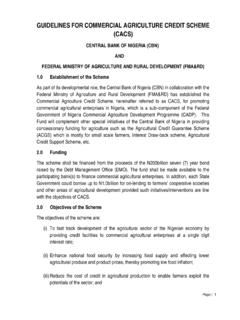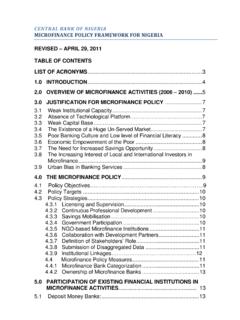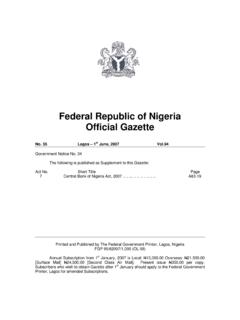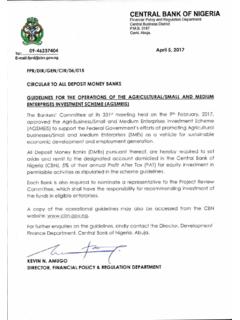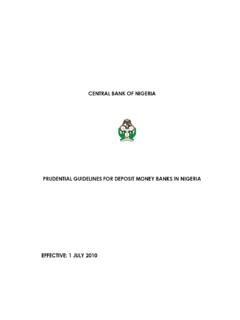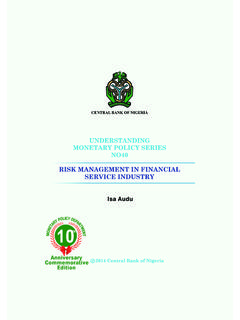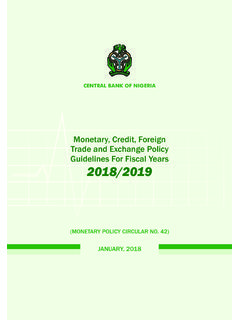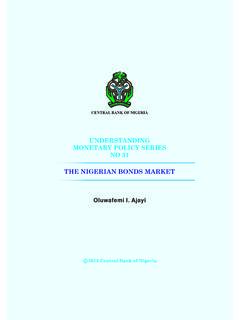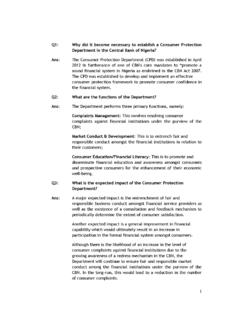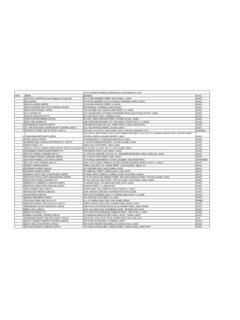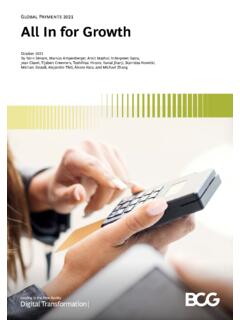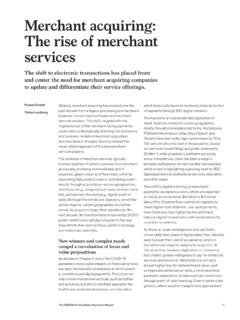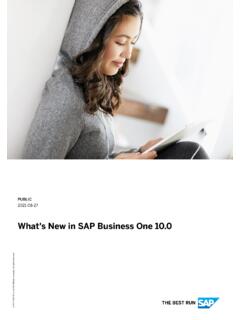Transcription of REGULATION ON ELECTRONIC PAYMENTS AND …
1 REGULATION ON ELECTRONIC PAYMENTS AND COLLECTIONS FOR PUBLIC AND PRIVATE SECTORS IN NIGERIA REVISED 2019 1 | P a g e TABLE OF CONTENTS PART 1 .. 2 1. PREAMBLE .. 2 2. OBJECTIVE .. 2 3. SCOPE .. 2 4. ROLES AND RESPONSIBILITIES .. 3 THE CBN .. 3 CBN REGULATED STAKEHOLDERS .. 3 Deposit Money Banks (DMBs), Other Financial Institutions (OFIs) and Mobile Money Operators (MMOs) .. 3 Payment Solution Service Providers (PSSPs) .. 4 5. INFRACTIONS AND SANCTIONS .. 5 PART 2 .. 5 6. OPERATIONAL STANDARDS FOR OTHER STAKEHOLDERS .. 5 Payers .. 5 Beneficiaries .. 6 Employees and Pensioners .. 6 Suppliers .. 7 Taxes, Levies, Dues (& other revenue) Collecting Organizations.
2 7 Pension Fund Administrators (PFAs) and Pension Fund Custodians (PFCs) .. 8 7. MISCELLANEOUS .. 8 DISPUTE RESOLUTION .. 8 COMPLIANCE .. 9 8. DEFINITION OF TERMS .. 9 9. COMMENCEMENT .. 11 SCHEDULE 1 .. 12 Infractions and sanctions for DMBs, OFIs and MMOs .. 12 SCHEDULE 2 .. 14 Infractions and sanctions for PSSPs .. 14 2 | P a g e REGULATION ON ELECTRONIC PAYMENTS AND COLLECTIONS FOR PUBLIC AND PRIVATE SECTORS IN NIGERIA PART 1 1. PREAMBLE The Central Bank of Nigeria (CBN)the Bank in exercise of its powers under the CBN Act, 2007, hereby issues the REGULATION on ELECTRONIC PAYMENTS and Collections for Public and Private Sectors in Nigeria (the REGULATION ).
3 The REGULATION is a revision of the Guidelines on ELECTRONIC Payment of Salaries, Pensions, Suppliers and Taxes in Nigeria (2014), and is intended to guide the end-to-end ELECTRONIC payment of salaries, pensions and other remittances, suppliers and revenue collections in Nigeria. 2. OBJECTIVE The objective of the REGULATION is to fully align with the core objectives of the National PAYMENTS System Vision 2020 (PSV2020) to ensure the availability of safe, effective and efficient mechanisms for conveniently making and receiving all types of PAYMENTS from any location and at any time, through multiple ELECTRONIC channels.
4 This will reduce the time and costs of transactions, minimise leakages in revenue receipts and at the same time provide reliable audit trails, thereby ensuring that the Nigerian PAYMENTS System aligns with international best practices. This REGULATION is therefore set out to provide all stakeholders with the operational procedures that guide end-to-end ELECTRONIC payment for the Public and Private Sector. 3. SCOPE This REGULATION applies to all CBN regulated entities operating in Nigeria and mandates adoption, implementation and compliance with the directives on end-to-end ELECTRONIC PAYMENTS of all forms of salaries, pensions & other remittances, suppliers, revenue collections including but not limited to taxes, levies, penalties, recoveries, assessments, and the disbursement of funds for social programs PAYMENTS bills, honorarium, scholarships, allowances, etc.
5 Herein referred to collectively as PAYMENTS and collections 3 | P a g e 4. ROLES AND RESPONSIBILITIES THE CBN Shall - a) promote the adoption of end-to-end ELECTRONIC payment by all Stakeholders; b) license end-to-end ELECTRONIC payment solution, systems and service providers, regulate and supervise their operations; c) create and maintain a platform for constant interaction and engagement of all ELECTRONIC payment industry stakeholders; d) ensure all statutory PAYMENTS , remittances and collections of all revenues are undertaken only on a CBN approved end-to-end ELECTRONIC payment platform .
6 E) ensure constant review and update of this REGULATION to reflect new developments that can support the long-term success of the initiative; f) adjudicate in the cases of disputes; g) maintain a Help Desk to provide enlightenment, receive complaints and monitor resolution of the reported cases and publish customer service/contact details via multiple platforms; h) collaborate with other statutory and regulatory agencies whose cooperation is required for the effective implementation of this REGULATION . CBN REGULATED STAKEHOLDERS The CBN regulated stakeholders refer to all financial institutions, PAYMENTS Service Providers and other entities licensed and regulated by the CBN which includes, but not limited to the following: Deposit Money Banks (DMBs), Other Financial Institutions (OFIs) and Mobile Money Operators (MMOs) DMBs, OFIs and MMOs shall - a) promote the adoption of end-to-end ELECTRONIC PAYMENTS by all stakeholders covered by this REGULATION .
7 B) provide payers and beneficiaries with appropriate accounts with DMBs, OFIs or any other approved channel for receiving PAYMENTS such as mobile money/ ELECTRONIC wallet, subject to the CBN s approved KYC limits; 4 | P a g e c) process ELECTRONIC payment instructions in accordance with subsisting PAYMENTS system and clearing system rules; d) publish customer service/ contact centres details via multiple media channels and maintain customer service contact centres, to promptly attend to all ELECTRONIC payment enquiries and challenges within stipulated timelines; and report of customer complaints, indicating resolution status; e) make available any or combination of the following data sets, as may be applicable, along with the mandatory returns to the CBN, on a monthly basis or as may be otherwise specified: I.
8 Number of salary/pension/supplier/tax paying organisations II. Salaries/pension/supplier/tax payment transactions count III. Salaries/pension/supplier/tax payment transactions value per payment method given below; o End-to-end; o Bank Assist; o Cheques; o Manual; f) in the event of duplicated/excess PAYMENTS , establish a recovery process engaging both Payers and Beneficiaries in line with subsisting CBN REGULATION . Payment Solution Service Providers (PSSPs) A PSSP shall - a) obtain a license from the CBN to operate as a PSSP; b) offer CBN approved end-to-end ELECTRONIC payment solutions, systems and services to all stakeholders; c) publish customer service/contact details via multiple media and maintain customer service contact centres to promptly attend to all ELECTRONIC payment enquiries and complaints; d) make available any or combination of the following data sets, as may be applicable, along with the mandatory returns to the CBN, on a monthly basis or as may be otherwise specified: I.
9 Number of salary/pension/tax paying client organisations; II. Salaries/pension/tax payment transactions count; 5 | P a g e III. Salaries/pension/suppliers/tax payment transactions value per payment method given below; o End-to-end o Bank Assist o Cheques o Manual e) comply with transaction completion and unapplied funds return timelines as stipulated by the CBN. 5. INFRACTIONS AND SANCTIONS Any DMB, OFI or MMO that fails to discharge the responsibilities under Section as detailed in Schedule 1 of this REGULATION shall be penalised as provided in the Schedule. Any PSSP that fails to discharge the responsibilities under Section as detailed in Schedule 2 of this REGULATION shall be penalised as provided in the Schedule.
10 PART 2 6. OPERATIONAL STANDARDS FOR OTHER STAKEHOLDERS This section refers to all other stakeholders which are not regulated by the CBN. They include, but are not limited to the following: Payers Payers shall - a) adopt end-to-end ELECTRONIC payment of salaries for employee staff strength of 20 and above; b) maintain appropriate account with DMBs or OFIs; c) adopt a CBN approved end-to-end ELECTRONIC payment platform and use for all forms of payment and collections; d) provide basic infrastructure for making and receiving ELECTRONIC PAYMENTS ; e) ensure employees are given basic training to use adopted platform ; 6 | P a g e f) use only validated account details to ensure PAYMENTS are made to intended beneficiaries.
